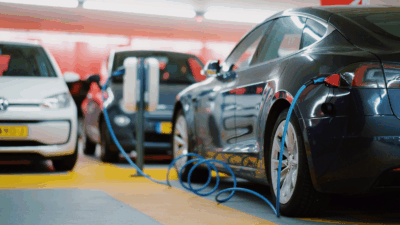The Global Auto Industry Is Recentering Around China
Overseas sales of China-made cars hit a record high in 2023, likely outpacing Japan to make China the world’s top exporter.

Sign up for smart news, insights, and analysis on the biggest financial stories of the day.
China’s auto industry is shifting into a higher gear.
Overseas sales of China-made cars hit a record high in 2023, likely outpacing Japan to make China the world’s top exporter, according to the China Passenger Car Association. Meanwhile, international car makers are having an even harder time making inroads inside the Middle Kingdom’s massive car market.
To Russia, With Love
Prohibitively high tariffs mostly keep Chinese cars from ever mingling with Fords and Chevys on American roadways. Europe, too, has largely been skeptical of Chinese imports, with the EU last year opening an antitrust probe into the Chinese government subsidies allegedly propping up the nation’s automaking industry. But there are still plenty of customers around the globe to snap up Chinese cars. Case in point: With virtually all Western carmakers ceasing business in Russia amid the country’s invasion of Ukraine, Chinese carmakers have happily steered into the sales vacuum. Last year, Russian consumers purchased about 800,000 China-made cars, according to the China Passenger Car Association, a roughly five-fold increase from 2022.
Overall, Chinese carmakers shipped an estimated 5.26 million cars overseas in 2023, the industry group says, or likely 1 million more than Japan’s auto industry, long the pace car in global sales. American and European automakers, meanwhile, are increasingly finding themselves locked out of China’s massive market:
- Last year, GM sold fewer vehicles in China than it did in the US for the first time since 2009, with deliveries in China dropping roughly 9% to 2.1 million while US sales increased to nearly 2.6 million, the company said. The company sold more than 4 million cars in China in 2017.
- Despite a $5 billion investment to maintain its top market position, Volkswagen, which has long seen half of its annual profits come from China sales, lost its top spot in China’s market last year to domestic player BYD.
Overall, international brands have seen their market share in China shrink to about 44% in December, from 64% in 2020. “With the exception of Tesla, foreign brands were caught flat-footed as they did not anticipate the market shift [to EVs] and are rapidly losing relevance,” Bill Russo, Chrysler’s former China head and founder of Automobility, wrote in a recent research note.
Electric Boogaloo: Speaking of EVs, analysts at BloombergNEF on Tuesday published a report predicting sales of electric vehicles and plug-in hybrids to increase about 22% in 2024 to around 16.7 million vehicles — good for about one-fifth of total car sales. That would mark a bit of a slowdown in sales growth rate, after a 33% jump in 2022. But fret not, tree huggers: the BNEF analysts predict a sales boom to come in 2025 and 2026 when a slew of cheaper EV models are due to hit Western markets.











